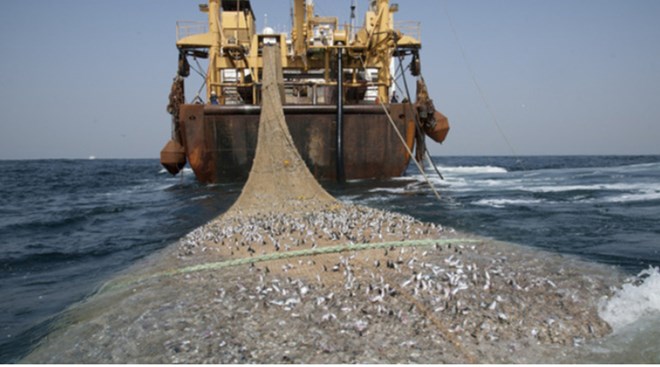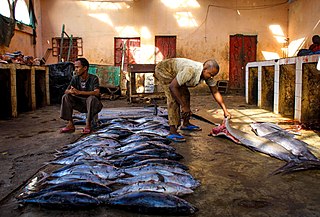Foreign IUU fishing operations are frequently facilitated by local Somali agents, often in cooperation with government or quasi-governmental actors, who for a fee provide fishing licences, flag registrations, falsified export documentation and even armed onboard security detachments.
As the GI-TOC has noted in previous research, there is also a potential overlap in the illicit networks involved in IUU fishing and in arms trafficking from Iran to Somalia and Yemen.21 The owner of at least one of the dhows licensed by Puntland – the Al-Aqris – has been previously identified by the GI-TOC as having possible ties to a Somali arms trafficking network.22 The businessman – who is based out of the port of Konarak, Iran – gave the name of his fishing agent in Somalia as ‘Sadam’. Sadam, the businessman told the GI-TOC, would arrange for two armed Somalis onboard, as well as fishing licences from Puntland authorities.23 ‘Iranian dhows have been warned not to go to Somalia, but Puntland authorities say that as long as they invite us, we can stay as long as we like’, he said, adding that the cost of a 45-day licence – exclusive of an armed guard detachment – was typically US$1 500.24 The GI-TOC subsequently identified the businessman’s local agent ‘Sadam’ as Sadam Abdi Ismail, a member of a prominent arms smuggling network in Puntland.25 Ismail was listed as the agent for eight of the 52 Iranian fishing vessels licensed by the Puntland administration in September and October 2020.
The 2015 maritime seizure of the dhow MV Nasir provided additional evidence of a possible nexus between arms trafficking and IUU fishing. On 24 September 2015, the Nasir was interdicted by Australian naval vessel HMAS Melbourne while transporting anti-tank guided missiles and other weaponry reportedly destined for the rebel Houthi administration in Yemen.30 The master of the vessel at the time of its seizure was Iranian national Javed Hoot (Figure 4), who later claimed ownership of seven dhows, which he used for independent arms trafficking operations into Somalia.31 Hoot also admitted involvement in the Somali fisheries sector. He stated that he would routinely pay US$10 000 per vessel to a Somali agent, who would secure the necessary permissions to fish and arrange for two armed guards to be stationed on board.32The reported owner of the seized arms consignment, Mashad-based Iranian national Shebab Meer Kazai, also confirmed his involvement in Somali fisheries. Kazai stated that he would pay US$15 000 to a local Somali agent to receive three armed guards on board fishing vessels he owned, as well as the necessary permissions from the Puntland administration.33 ‘We are protected’, he said.
Far more egregious, however, was Puntland’s issuance of licences to Thai fishing vessels engaging in human trafficking and forced labour practices. The case of the Marwan 1, an erstwhile Thai fishing vessel employing trafficked Kenyan seafarers, was but the latest example of what may be described as the Puntland administration’s complicity in Somalia’s ‘slave fishing’ vessels.
In his book The Outlaw Ocean, Urbina extensively documented the labour abuses and human rights violations committed aboard the Somali 7, including beatings, lack of medical care, human trafficking, death threats and unpaid wages.39 The abuses, Urbina noted, took place with the knowledge and complicity of both Somali federal government and Puntland administration officials.4
According to members of this crew, the Marwan 1 turned out to be another forced labour fishing operation. From April to July 2019, the Kenyan crew on the Marwan 1 endured deplorable working conditions, leading to multiple untreated injuries.50 They were reportedly forced to work up to 20 hours per day and sleep in the open, and were denied medical treatment.51Following a confrontation with the captain of the vessel, crewmembers were denied food for two days and were threatened with being locked in cold storage and being shot.52 In July 2019, the crew eventually managed to contact the International Transport Workers’ Federation, which in turn notified the Kenyan ambassador to Somalia. The following month, the seafarers returned home to Kenya after a long and onerous repatriation journey.53 Despite being promised a salary of KES 26 000 (US$240) per month,54 each crewmember ultimately received between US$450 and US$500 for a total of four months’ work, which was only sufficient to purchase airfare to Kenya.55
The individuals contacted by Somlink and Al Wesam included the prominent Puntland-based arms trafficker Abdirahman Mohamed Omar (aka ‘Dhofaye’) and Yemen-based trafficker Mohamed Hussein Salad. These communications may constitute preliminary evidence of a nexus between IUU fishing and arms trafficking operations, the existence of which has been previously hypothesized by the GI-TOC.6


 The presence of IUU fishing was also one of the factors that once spurred piracy off the Horn of Africa. (Source:
The presence of IUU fishing was also one of the factors that once spurred piracy off the Horn of Africa. (Source: 

